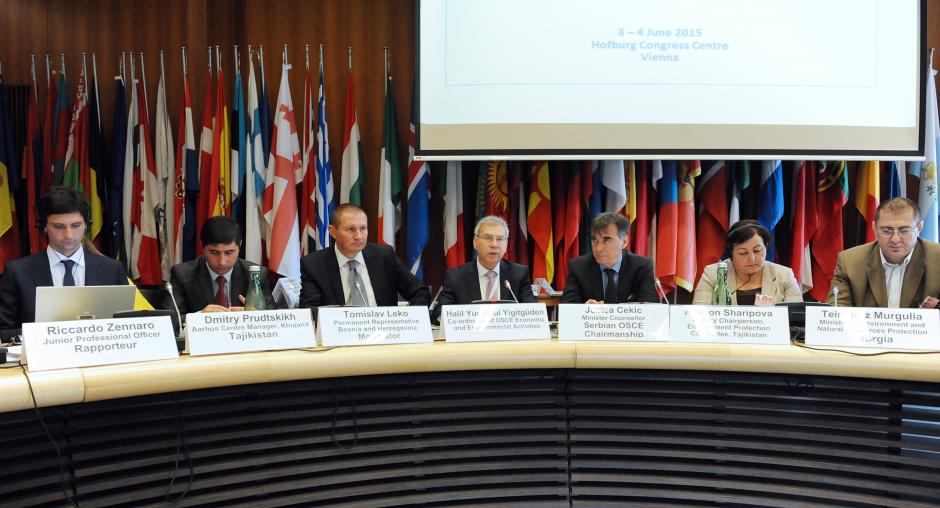OSCE brings together Aarhus Centres from 14 countries to discuss environmental challenges and opportunities for co-operation

VIENNA, 4 June 2015 – Environmental co-operation, networking and partnerships were the focus of the two-day Aarhus Centres Annual Meeting, organized by the Office of the Co-ordinator of OSCE Economic and Environmental Activities, which concluded in Vienna today.
Aarhus Centre Managers and Aarhus Convention National Focal Points from Albania, Armenia, Azerbaijan, Belarus, Bosnia and Herzegovina, Georgia, Kazakhstan, Kyrgyzstan, Moldova, Montenegro, Serbia, Tajikistan, Turkmenistan, and Ukraine together with representatives of international and regional organizations and OSCE Field Operations discussed the contribution of Aarhus Centres to environmental democracy, transparency and accountability.
“During our OSCE Chairmanship, within the Economic and Environmental Dimension, we fully support the implementation of the Aarhus Convention and the work of the Aarhus Centres by putting it high on our agenda this year, and we will continue to do so in the future”, said Mr. Jovica Cekic, the representative of the Serbian Chairmanship.
Referring to the OSCE’s comprehensive approach to security, Halil Yurdakul Yiğitgüden, the Co-ordinator of OSCE Economic and Environmental Activities, said: “Aarhus Centres are an important tool for us in addressing environment and security challenges, especially at the community level.”
The Director of Environmental Division of the UN Economic Commission for Europe, Marco Keiner emphasized that “Aarhus Centres have been at the forefront of the practical implementation of the Aarhus Convention and its Protocol on Pollutant Release and Transfer Registers on the ground.”
Ambassador Tomislav Leko, Permanent Representative of Bosnia and Herzegovina and Chair of the OSCE’s Economic and Environmental Committee drew attention to the three pillars of the Aarhus Convention: “By facilitating access to information and public participation in decision-making and by promoting access to justice in environmental matters, the Aarhus Centres provide the OSCE with an exceptional tool to promote environmental democracy.”
Aarhus Centre stakeholders showcased their activities in the field of water management, climate change adaptation and disaster risk reduction, shared best practices and lessons learnt, and explored opportunities for enhanced co-operation and partnership.
An Aarhus Centre representative from Tajikistan, Dimitry Prudtskikh, emphasized that environmental problems can only be solved through dialogue and close co-operation among local communities, civil society and local authorities. “A clean environment and fair sharing of natural resources are prerequisites for healthy, peaceful and prosperous communities.”
The meeting featured the signing of a Joint Declaration for co-operation among the Aarhus Centres in the South-Eastern European region.
The OSCE has been supporting the establishment and operation of Aarhus Centres since 2002 mostly through the Environment and Security (ENVSEC) Initiative. To date a network of 59 Aarhus Centres is operating in 14 countries. The Governments of Austria, Finland, Norway, Sweden, Switzerland, and the United States are currently among the major supporters of the Aarhus Centres’ activities.
An infographic on the Arhus Centres and the environmental challenges they address can be found here.
